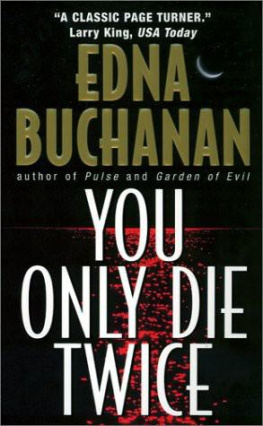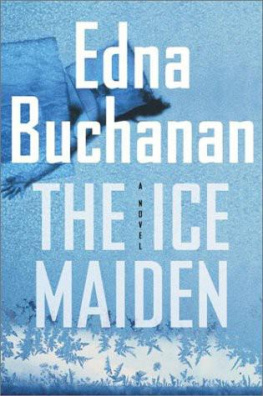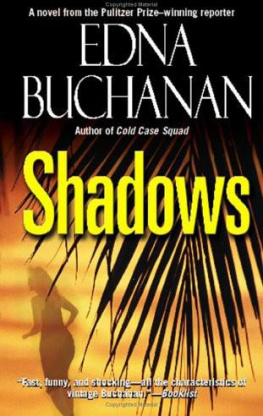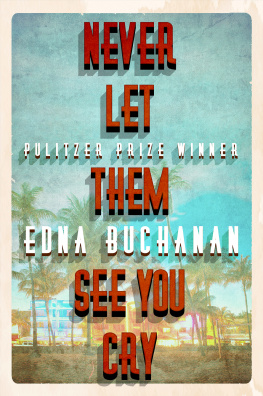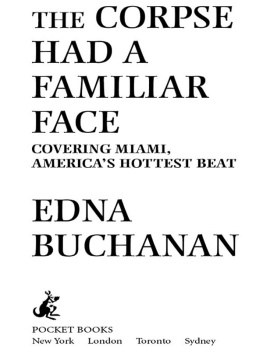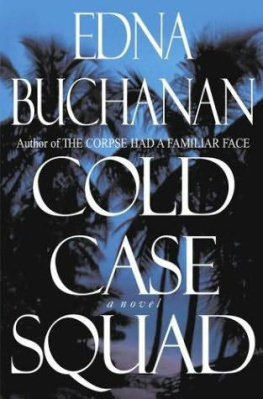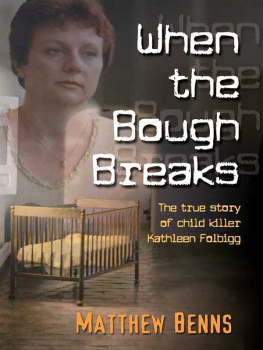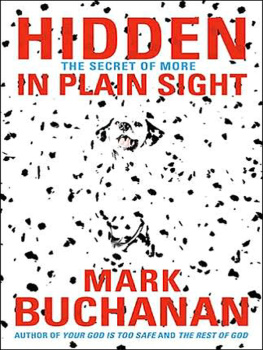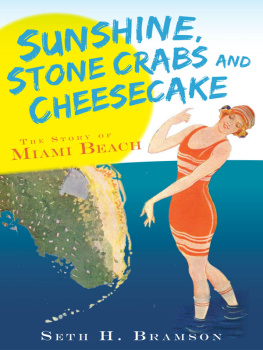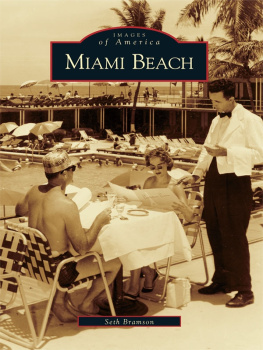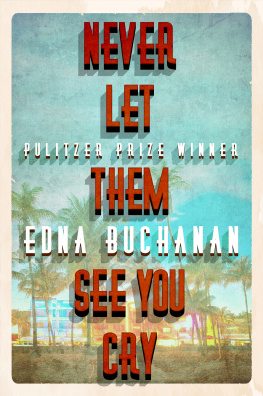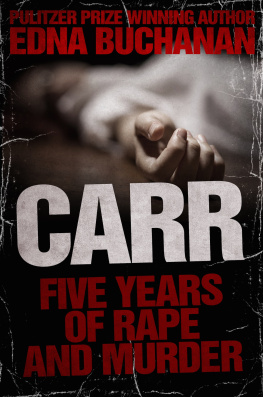EDNA
BUCHANAN
YOU
ONLY DIE
TWICE
A N o v e l
FOR MICHAEL CONGDON
It was deja vu all over again.
YOGI BERRA
That which hath been is now; and that which is to be hath already been.
ECCLESIASTES 3:15
1
Hot sand sizzled beneath my feet. An endless turquoise sea stretched into infinity. Bright sailboats darted beyond the breakers, their colors etched against a flawless blue sky. Playful ocean breezes kissed my face, lifted my hair off my shoulders, and ruffled my skirt around my knees. The day was perfect, a day to die for. Too bad about the corpse bobbing gently in the surf.
She appeared serene, a drifting, dreaming mermaid, narrow-waisted and full-breasted, with long slim legs: an enchanting gift from the deep. She wore seaweed in her hair, which was long and honey-colored, streaked by brilliant light as it swirled like something alive just beneath the water's glinting surface.
Had she been caught by the rip current, that fast-moving jet of water that races back to the sea, or did she plunge from a cruise ship or a party boat? Perhaps she was a tourist who went wading, unaware of the sharp drop-off only a few feet from shore. But if so, why was she naked?
Clearly she was no rafter drowned in a quest for freedom and a new life, or gold chains and designer jeans.
Her fingertips and toenails gleamed with a pearly luster, as though polished to perfection by the tides. This woman appeared to have lived the good life. None of the grotesqueries that the sea and its creatures inflict on the dead had overtaken her yet. Obviously she had not been in the water long.
I had overheard the initial radio transmission on the
"floater" while working on a story at Miami Beach police headquarters. My ears had perked up. My name is Britt Montero, and I cover the police beat in this city where everything is exaggerated, where colors are too vivid to be real, where ugly is uglier, beautiful is breathtaking, and passions run high. Every day on this job, I see new faces. Many are dead. My mission is to chronicle their stories and preserve them permanently--on the pages of the newspaper of record, in our files, and on our consciousness, forever.
My editors at the Miami News share a somewhat different view of my job description. As a result, I had been dutifully poring through tall gray stacks of computer printouts in the police public information unit.
The art department planned a locator map for Sunday's paper, to accompany my piece on the crime rate. My task was to compile the crime statistics zone by zone and identify the scene of every rape, murder, armed robbery, and aggravated assault.
I hate projects based on numbers. If words are my strength, decimal points are my weakness. Calculating the number of violent crimes per hundred thousand population has always been problematic for me. Is it 32
crimes per 100,000, 320 or 3.2? A live story on a dead woman is infinitely more intriguing.
Studying the body more closely, I could see that we shared characteristics in common. We were close in age and appearance. My plans, to bodysurf and sunbathe today along this same sandy stretch, had been ruined by the DBI (Dull But Important) project I had agreed to complete on my day off. Her plans had also been ruined. All of them. Permanently. Some quirk of fate had delivered us both to the coastal strip I had yearned for, sun on my shoulders, sea breeze in my hair--but it wasn't the day at the beach either one of us had in mind.
Along with a lifeguard, two uniformed cops, and a growing crowd, I watched a detective trudge toward us across the sand. Emery Rychek was an old-timer, one of the few holdouts who had not opted for guayaberas when Miami Beach police dress codes were relaxed.
Unlit cigar clenched between his teeth, his white shirt open at the throat, his shapeless gabardine jacket flapping in the breeze, Rychek handled more than his share of deaths, most of them routine. Young cops want sexier calls, not grim reminders of their own mortality.
Rychek never seemed to mind the unpleasant tasks that come with a corpse.
"So, you beat me here, Britt," he acknowledged, his voice a gravelly rumble.
"I was at the station, working on a story about the crime rate. I heard it go out."
Rychek chewed his cigar. His smelly stogies often came in handy, to mask the stench of corpses gone undiscovered too long, though colleagues routinely debated which odor was more nauseating. No need for him to light up here. This corpse was as fresh as the sea air.
"Well, lookit what washed up." He appraised her for a moment, fierce eyebrows raised in mock surprise, then turned to the cops. "Whattaya waiting for, the tide to go out and take her with it?"
"Thought maybe we should leave her like she was till you guys took a look," one said.
Rychek shook his head in disgust as the two cops stripped off their shoes and socks, rolled up their pant legs, pulled on rubber gloves, and waded gingerly into the sun-dappled shallows. Green water streamed from her hair as they dragged her ashore. Her pale half-open eyes stared hopefully at the sky, her expression reverent. Her only adornment was a gold earring, the delicate outline of a tiny open heart.
Excellent, I thought. Distinctive jewelry is a good start for those of us trying to identify the dead. But this woman's youth and beauty guaranteed she'd be no lost soul. I dreaded the cries of her loved ones, sure to appear momentarily, frantic with grief, hearts breaking.
"A great body is a terrible thing to waste," one of the cops muttered.
Rychek ignored him, as he straddled the naked woman, cigar still clenched between his teeth. He grunted as he tugged her pale form one way, then the other, seeking wounds or identifying marks. I watched, painfully aware that there is no modesty, no privacy in death.
"Hey, Red." Rychek glanced over my shoulder.
Lottie Dane was elbowing her way through the growing throng of gawkers. She is the best news shooter in town and my best friend. Her red hair whipped wildly in the wind as she strode across the sand in blue jeans and hand-tooled cowboy boots, her twin Canon EOS cameras, a wide-angle lens on one and a telephoto on the other, slung from leather straps around her neck.
"Hell-all-Friday, who is she?" Lottie murmured, shutter clicking. "Sure don't look like the usual coffin fodder that washes up on this beach. Where's her clothes? How'd she git here?"
"Gimme a chance," Rychek protested. "I just got here myself."
The big eyes of a small boy were fixed on the dead woman's breasts. Runty and pale, wearing baggy swim trunks a size too large, he gaped from the forward fringe of the crowd. Where is his mother? I wondered, as a beach patrolman brought the detective a yellow plastic sheet from his Jeep.
"What do you think?" I asked Rychek, as he peeled off his rubber gloves.
"No bullet holes or stab wounds," he said. "We'll know more when we get a name on her. Most likely it's an accidental drowning."
"Is the M.E. coming out?"
He shook his head. "The wagon's on the way." Medical examiners don't normally attend drownings these days, except in cases of mass casualties, obvious foul play, or refugee smugglers who routinely drop their human cargo offshore--sometimes way too far offshore.
"My Raymond saw her first!" The boy's proud mother had finally made an appearance. She wore big sunglasses, pink hair curlers under a floppy sun hat, and a bikini that exposed a ruddy hysterectomy scar on her glistening belly. She smelled strongly of coconut-scented suntan oil and spoke with a New York accent.
Raymond, pail and shovel forgotten, still stared, transfixed, at the sheet-covered corpse.
"Unbelievable," his mother told all who would listen. "Raymond kept trying to tell me, but I didn't pay attention. That kid is always into something." She shook her head smugly. "I shoulda known.
Next page
